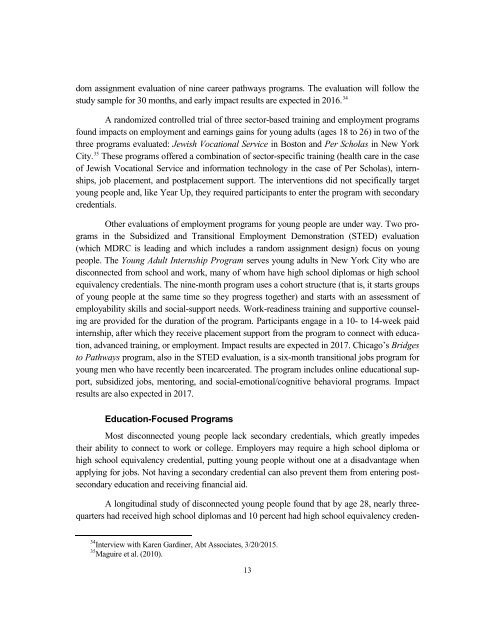Opportunity Youth: Disenfranchised Young People
Opportunity Youth: Disenfranchised Young People
Opportunity Youth: Disenfranchised Young People
You also want an ePaper? Increase the reach of your titles
YUMPU automatically turns print PDFs into web optimized ePapers that Google loves.
dom assignment evaluation of nine career pathways programs. The evaluation will follow the<br />
study sample for 30 months, and early impact results are expected in 2016. 34<br />
A randomized controlled trial of three sector-based training and employment programs<br />
found impacts on employment and earnings gains for young adults (ages 18 to 26) in two of the<br />
three programs evaluated: Jewish Vocational Service in Boston and Per Scholas in New York<br />
City. 35 These programs offered a combination of sector-specific training (health care in the case<br />
of Jewish Vocational Service and information technology in the case of Per Scholas), internships,<br />
job placement, and postplacement support. The interventions did not specifically target<br />
young people and, like Year Up, they required participants to enter the program with secondary<br />
credentials.<br />
Other evaluations of employment programs for young people are under way. Two programs<br />
in the Subsidized and Transitional Employment Demonstration (STED) evaluation<br />
(which MDRC is leading and which includes a random assignment design) focus on young<br />
people. The <strong>Young</strong> Adult Internship Program serves young adults in New York City who are<br />
disconnected from school and work, many of whom have high school diplomas or high school<br />
equivalency credentials. The nine-month program uses a cohort structure (that is, it starts groups<br />
of young people at the same time so they progress together) and starts with an assessment of<br />
employability skills and social-support needs. Work-readiness training and supportive counseling<br />
are provided for the duration of the program. Participants engage in a 10- to 14-week paid<br />
internship, after which they receive placement support from the program to connect with education,<br />
advanced training, or employment. Impact results are expected in 2017. Chicago’s Bridges<br />
to Pathways program, also in the STED evaluation, is a six-month transitional jobs program for<br />
young men who have recently been incarcerated. The program includes online educational support,<br />
subsidized jobs, mentoring, and social-emotional/cognitive behavioral programs. Impact<br />
results are also expected in 2017.<br />
Education-Focused Programs<br />
Most disconnected young people lack secondary credentials, which greatly impedes<br />
their ability to connect to work or college. Employers may require a high school diploma or<br />
high school equivalency credential, putting young people without one at a disadvantage when<br />
applying for jobs. Not having a secondary credential can also prevent them from entering postsecondary<br />
education and receiving financial aid.<br />
A longitudinal study of disconnected young people found that by age 28, nearly threequarters<br />
had received high school diplomas and 10 percent had high school equivalency creden-<br />
34 Interview with Karen Gardiner, Abt Associates, 3/20/2015.<br />
35 Maguire et al. (2010).<br />
13

















